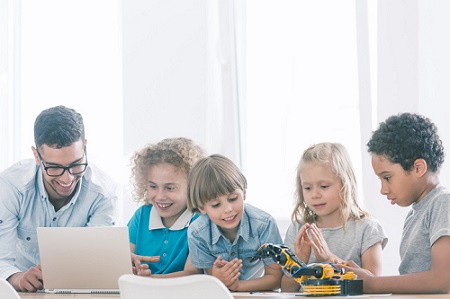
On Wednesday, a snapshot of the Education Report 2020 provided some key insights into the challenges facing Australia’s education leaders as they adjust to a rapidly changing world.
The report, which surveyed senior education leaders in all states and territories, identified a number of pressing issues that are impacting on the ability of educators to improve professional development, student and staff wellbeing and the provision of technology across their campuses.
The Educator also asked educators what they believe are the most important skills for students to be learning in 2020.
‘Learning to think without a phone screen’
One NSW school principal surveyed in the report pointed to the need for schools to develop “high level social competencies that are being eroded by the prevalence of social media”.
A senior teacher at a WA private school said students “need to be critical and creative thinkers who are empathetic to those around them”.
“In an age of technological advancement, students must learn these skills and be able to communicate effectively,” the teacher said.
Back in NSW, a senior teacher agreed, saying that students need to “use their brain” and learn how to think independently of a machine.
“Students need to know how to think and solve problems without recourse to a calculator/computer,” the respondent said.
“They must know how to communicate properly, how to avoid anti-social media and how to function without a device of some sort and be more self-sufficient”.
‘Thinking critically and creatively’
Other educators pointed to the growing importance of Science, Technology, Engineering and Maths (STEM) skills as new and emerging technologies reshape the workplace.
“All students must learn STEM skills. Bring back IT as a standalone subject, not just integrated into other subjects,” a senior teacher working at a Victorian public school said.
However, the respondent acknowledged that “interpersonal and life skills are also very important” for students to learn.
Meanwhile, a head of department working at a QLD private school said critical problem-solving skills and abilities are just as important at school as they are in the world outside the school gates.
“Subjects like STEM encourage this and should be included in the curriculum,” the QLD department head commented.
To one NSW deputy assistant principal, the most important skill for students to be learning is “to analyse the root cause of a problem any type and work towards a positive productive solution, to find a way forward”.
A Victorian teacher said students need to master “rapid change management, or the ability to quickly learn new things and critically understand and ensure their impact”.
“This skill will enable them to navigate a world of increasingly rapid change,” the teacher said.
‘Bouncing back from failure’
A deputy assistant principal working at a Catholic school in Brisbane noted the value of students being “active participants in a broad range of learning opportunities” and “having confidence to take risks responsibly and to achieve their full potential”.
A director of strategic operations at one SA school said the changing employment landscape means that young people will need different skill sets to thrive in a technology rich, globalised competitive markets.
“I believe students need to learn how to bounce back from both success and failure,” they said.
“They need to learn how to adapt their own ideas and accept the ideas of others as valid. Working as a collaborative team of varying social and academic abilities is essential”.
‘Being inclusive and respectful of others’
One NSW public school teacher said students need to learn to be inclusive in their practices.
“This includes them interacting and engaging with a diverse range of students from their school, other schools in the region and in the community,” the teacher said.
“A more inclusive society means a better chance of strong future economy and enriching workforce”.
This sentiment was echoed by a principal working in a NSW public school, who said students need to learn tolerance to accept that others are different.
“Learning can only be accomplished when students accept and tolerate others [including adults in the school environment],” he said.
“Life would be different if people followed our school PBL values and were Safe, Respectful & Responsible”.
‘Question everything you say and hear’
One respondent said the most important thing for schools to be teaching students is to question everything they see and hear.
“Students must not to accept anything as a fete accompli,” the teacher said.
They must think creatively and critically through any situation, working collaboratively to achieve an outcome”.
The full version of the 2020 Education Report will be published in March.


